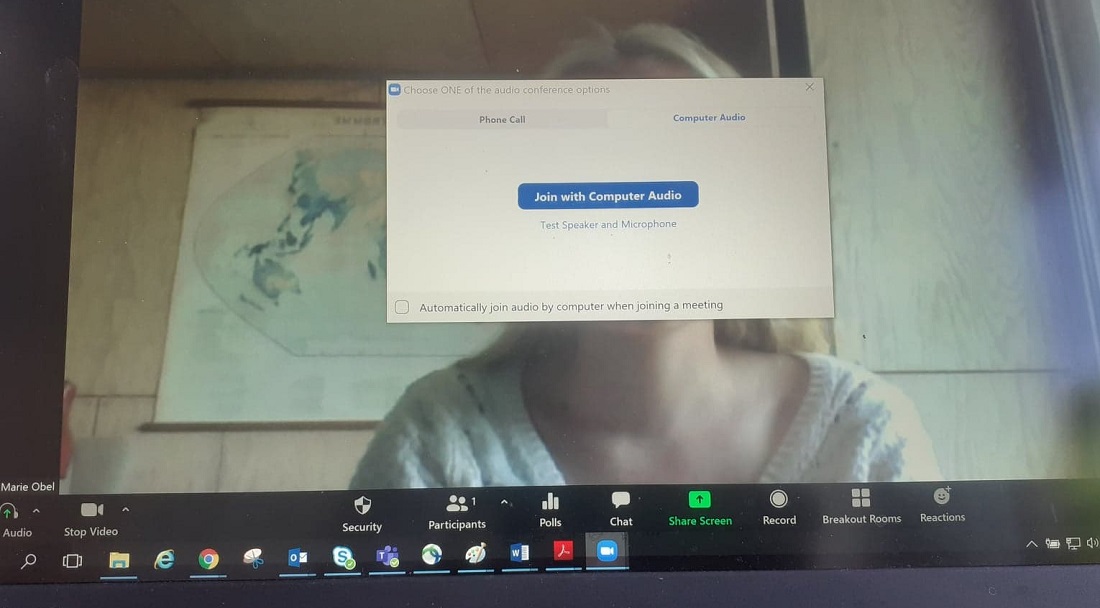Virtual Growth Opportunity at GLOBE
The GLOBE Institute had recently launched a sustainability initiative, when COVID-19 shut down the University of Copenhagen. The shutdown gave the institute an unexpected opportunity to increase its use of virtual participation – one of the objectives laid out in the initiative.

PhD-defences, job interviews and scientific conferences held online. This has been reality for the researchers at GLOBE over the past couple of months. The virtual transition has been faster and more far-reaching than the institute could have ever imagined when it initiated its sustainability initiative back in January. The initiative points to increased virtual participation as a means to lower the Institute’s carbon emissions. A 2018 estimate showed that one fourth of the institute’s carbon emissions from energy consumption and transportation relate to employee air travel.
The department has set up a group that is working on a sustainable transition of the institute. The group is looking at several initiatives, one of which is to make PhD-defences online as default, thus making it an active choice to fly in opponents. The Covid-lockdown offered a perfect opportunity to test online PhD-defences, as it was not possible for international researchers to participate physically.
Michael Borregaard, who is part of the working group, has experienced first-hand how online solutions can actually have positive side effects:
"My own PhD-student is defending her PhD online at the beginning of June. This has enabled her family to participate from China, her husband to participate from MIT and her external partner from Harvard to participate from there. They would have been excluded if the defence had taken place at the university in Copenhagen," he says.
Virtual solutions can also offer benefits in other areas. GLOBE hosted for instance a debate on sustainability and activism at the end of April, which had to be moved online to Zoom and YouTube. This made it easy for the participants to post questions and made the debate available to a broader audience. From Michael Borregaard’s experience, the virtual solutions offer new and exciting opportunities. His international research team have had meetings more frequently recently, using Zoom, and international students can follow classes from abroad.
Room for trial and error
Another initiative is to enable both hosting and participation in more online conferences and meetings, by ensuring that adequate e-conference facilities are available at all of the Institutes’ locations.
"We were working on getting adequate e-conference facilities installed on campus. But that turned out to be less relevant at present, due to the shutdown," Michael Borregaard tells. Luckily, the shutdown has nudged more people to use virtual solutions.
"The shutdown has given us a window of opportunity to test how we do things at the GLOBE Institute. There is room for making mistakes. Everyone has been forced to try virtual alternatives, even though it might not their preference," he says. "And all the knowledge gained can still be put to good use, when we return to campus."
Michael Borregaard is hopeful that the Institute will continue to utilise the benefits of online activities, when the university reopens.
"I hope that we will have more PhD-defences online in future and that we strive to use international opponents for several activities, when we fly them in. They could for example give a presentation or take part in research activity. We will further strive towards making presentations at conferences available online in future."
Well under way before the shutdown
The sustainability initiative involves more than air travel and virtual participation. It has a broad, science-based approach to sustainability that involves both education, research and the institute’s own overall energy consumption. It is essential to the institute that the approach is science-based.
"We work at a university, making it vital that we present a science-based approach. There are plenty of foggy sustainability initiatives out there. The University should be the lighthouse in the fog," Michael Borregaard emphasises.
Chemical use, sustainable procedures in the labs and general energy consumption are some of the areas the Institute is looking into. The Institute has designated an employee to test and implement more sustainable procedures in the labs. Efforts are also being made to outline the Institute’s total carbon footprint as well as making a carbon budget, to be used as the baseline for a knowledge-based approach. Initiatives and budget will be published on the institute's website to ensure transparency. For now, the shutdown has put this work on hold though.
"Right now the biggest effect we are seeing is a substantial reduction in our carbon emissions, caused by our employees working from home and no work related travel." Michael Borregaard smiles.
